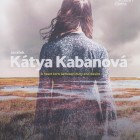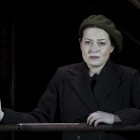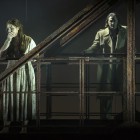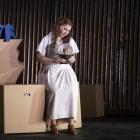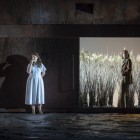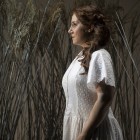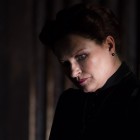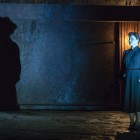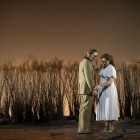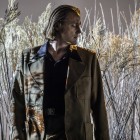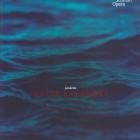Kátya Kabanová 2019Scottish Opera
Read more about the opera Kátya Kabanová
Janáček and Kátya
Kátya Kabanová was the first of Janáček's operas to be seen in Britain, when a young Charles Mackerras conducted it at Sadler's Wells in 1951. It was also the first to be heard in Scotland, at the 1964 Edinburgh Festival.
Kátya is usually considered to be the most popular of his operas, and in many ways the most conventional. Its subject is derived from a theatrical work of recognized importance. Ostrovsky's tragedy of 1859, variously translated as The Storm or Thunder, has occasionally been produced in its own right, including at the National Theatre in London.
Janáček's other operas are all derived from far more unusual themes. It is difficult to imagine another composer tackling one of those subjects, where Kátya could perhaps have been set by someone else. But no other composer could have produced a work of such immediacy or emotional impact.
In retrospect, it is puzzling Scottish Opera has performed it so little. Forty years ago, in 1979, Richard Armstrong conducted David Pountney's atmospheric staging, in which the title role was performed by Dame Josephine Barstow, an expert in the most dramatic areas of twentieth century repertoire. Kerstin Meyer sang a frightening Kabanicha.
Armstrong again conducted the second production, in 1993, when Kátya was sensitively performed by Helen Field. The revival of that staging in 1999 was dominated by the incandescent soprano Susan Chilcott in an unforgettable interpretation. Since then, the only production by the company was a small-scale, piano-accompanied tour of the Highlands and Islands in 2009 - in itself an adventurous project.
A new Kátya
This third full-scale staging is directed by Stephen Lawless. He worked with the company at the outset of his career, but has spent the last three decades successfully on the continent and across the Atlantic. His direction was generally successful, creating a set of three-dimensional characters and the all-important sense of a community context in which the tragedy is played out. Unusually, the setting was updated to the late Soviet era. The flared trousers and Boris's tight-fitting suit certainly suggest the 1970s. The Volga is not a pretty spot - mud-flats with rather unhealthy looking reed-beds, and a rusty steel bridge aloft that allows the villagers to avoid getting their feet wet (whether this restricted sightlines for upstairs audiences we can't say). The Kabanovs are still shown to be quite prosperous compared to the others, with early scenes apparently in their barn or warehouse. The short roles including Glasha, Feklusha and Kuligin all seemed to be given more prominence than usual - again emphasising the sense of a community.
By the time the production reached Edinburgh, Stuart Stratford was drawing quite glorious sounds from his orchestra. His style with this composer is wonderfully lyrical, while still building to some superbly dramatic climaxes. The final act with its storm sequences had an overwhelming impact.
The cast was led by Laura Wilde, recently an excellent Gretel in the Usher Hall, now making her company debut. As with the tricky Humperdinck role, she had the perfect voice for the part, not particularly powerful, but clearly projected and able to ride the orchestra with ease. She is also a subtle actor and held the audience through her mad scene. The vicious mother-in-law, Kabanicha, is a gift of a role for a superb dramatic mezzo such as Patricia Bardon. Fortunately she did not overdo the histrionics, relying on stillness and a ramrod-straight back. At curtain-call she received a few cheerful panto-style boos along with the cheers, a strange custom that seems to be taking hold here (not too keen on it, I must say).
The two tenors rivals for her affections, one American and one Australian, were both new to the company. Ric Furman, the Boris, has an interesting heldentenor voice. With a bright tone he would seem suited to Lohengrin and Walther, yet has already taken on the darker soundworld of Siegmund and Tristan. His voice soared beautifully in the second act duetting. Samuel Sakker made a bullish and unusually imposing Tikhon. The New Zealand bass Paul Whelan recently returned to Scottish Opera after a long gap to feature in the cast of Anthropocene. Here he stepped in at a fairly late stage when the originally-cast bass suffered an accident before rehearsals. He made an effective old merchant, fortunately not directed as a grotesque as sometimes happens. The young couple, Vanya and Varvara, made an enormously positive impact, beautifully sung, and with clear contrast between themselves and the 'senior' couple, even going for a carefree dip in the river.
In all, this was a pleasingly successful production that was received with huge enthusiasm by an audience many of whom must have been encountering this classic of the twentieth century repertoire for the first time.
Scottish Opera 2018/19
Scottish Opera's 2018/19 season started off with the company's first full-scale staging of one of the most popular works of the verismo school in Leoncavallo's Pagliacci. This was seen in Paisley in July - an impressively large-scale production with many local performers, all in a temporarily-erected tent. The new stagings included a world premiere, Anthropocene, an eagerly awaited further collaboration between Stuart MacRae and Louise Welsh. There was also a new Kátya Kabanová. Returning to the composition period of Pagliacci, the continuing Sunday afternoon concert series included Scottish premieres for Puccini's second opera, Edgar, and Mascagni's fifth, Silvano. There were also major revivals, and long tours, for Matthew Richardson's staging of Rigoletto from 2011 and Sir Thomas Allen's of The Magic Flute (2012).
Performance Cast
- Váňa Kudrjaš a school teacher
- Glaša an old servant
- Savel Prokofievich Dikoj a merchant
- Boris Grigorievich Dikoj's nephew
- Feklusha a pilgrim
- Marfa Ignatyevna Kabanová a merchant's widow, called Kabanicha
- Tikhon Ivanovich Kabanov Kabanicha's son
- Varvara foster-child in the Kabanov household
- Káterina Kabanová known as Katya, Tikhon's wife
- Kuligin a friend of Vána
- Bystander
- Woman in the crowd

